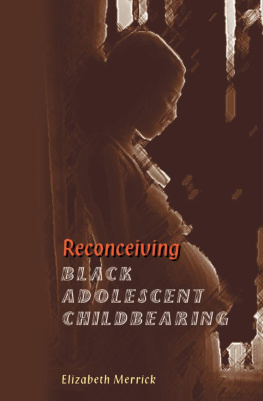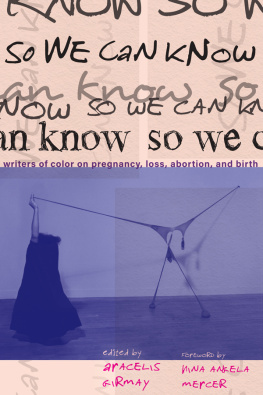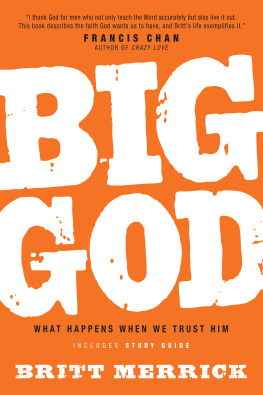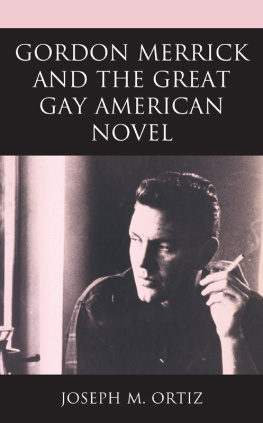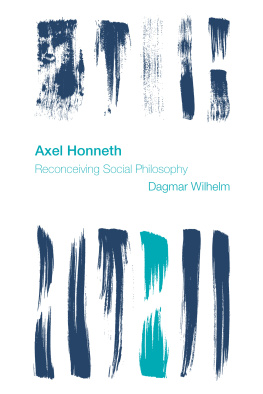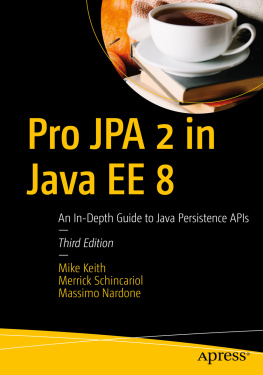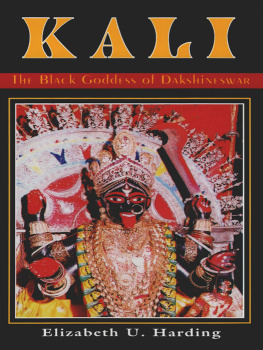Reconceiving Black Adolescent Childbearing
Reconceiving Black Adolescent Childbearing
Elizabeth Merrick, Ph.D.
First published 2001 by Westview Press
Published 2018 by Routledge
711 Third Avenue, New York, NY 10017, USA
2 Park Square, Milton Park, Abingdon, Oxon OX14 4RN
Routledge is an imprint of the Taylor & Francis Group, an informa business
Copyright 2001 Taylor & Francis
All rights reserved. No part of this book may be reprinted or reproduced or utilised in any form or by any electronic, mechanical, or other means, now known or hereafter invented, including photocopying and recording, or in any information storage or retrieval system, without permission in writing from the publishers.
Notice:
Product or corporate names may be trademarks or registered trademarks, and are used only for identification and explanation without intent to infringe.
Library of Congress Cataloging-in-Publication Data
A CIP catalog record for this book is available from the Library of Congress.
ISBN 13: 978-0-8133-6816-0 (pbk)
Contents
The young women who participated in the study deserve primary acknowledgment. Without their willingness to share their experiences, this research would not have been possible. This project was assisted by many people at different stages. In writing the book, I received invaluable feedback and support from Barbara Launer, Sallie Motch, Mary Sue Richardson, and Lisa Simon. I was also aided by the comments of an anonymous reviewer at Westview. Finally, I was fortunate to have the unflagging support of my husband, Sam, who with our children, Lizzie, Charlotte, and Sam, provided the incentive and encouragement necessary for me to finish.
I used condoms with every partner that I had except my babys father. I dont know why I didnt use it with him. Well, to tell you the honest truth, I wanted to have his child, I did. Thats the only reason I didnt use it. And I always wanted to have a child. But it just happened.
Edouine
Images of pregnant black teenagers and single black mothers are plentiful in the media and popular culture. These representations have fueled debates on the need for welfare reform and have focused public attention on adolescent pregnancy among black Americans. However, the pervasive focus on black adolescents tends to obscure the facts that the rates of black adolescent childbearing are at their lowest levels to date and that white adolescents are having babies in much greater numbers.1 Media portrayals of the phenomenon tap into middle-class beliefs about indiscriminate, promiscuous sexual activity as well as judgments of these young peoples disregard for their futures and those of their babies. On the one hand, these representations feed into middle-class fears about welfare abuse: that many are getting more than they should. On the other hand, these images simultaneously serve to confirm beliefs that these unwed adolescents, and their off-spring, get what they deserve as they remain trapped within limited circumstances. The relationship between adolescent childbearing and povertyas both an antecedent and a consequenceis often an explicit concern.
The unwed black welfare mothertypically envisioned as a teenager or as a woman who began her childbearing as a teenhas emerged as a powerful stereotype. The face of adolescent pregnancy is assumed to be black in discussions of what ought to be done about the problem and in the minds of most Americans. (This assumption, Luker points out, is both true and not true. It is true in the sense that rates among black adolescents are disproportionately high,2 however it is not true, statistically speaking, given that the majority of births to adolescents are to white teens.) Beliefs about adolescent childbearing, including those related to race, have been challenged by social construction theorists.3 Their critiques highlight the influence of social context and suggest that our current understandings of the problem of adolescent pregnancy are rooted less in fact and more in public sentiment. Such perspectives do not suggest that there is no problem, or that the problem has been socially constructed in all aspects. However, these critiques raise important questions about how the issue of adolescent pregnancy has been framed.4 In addition, Phoenix (1993) and others5 have directed attention to how the issue has been constructed along racial lines.
It is important to note that the issue of black adolescent childbearing has been largely constructed by mainstream white society. The national dialogue about adolescent childbearing featuring poor black adolescents is conducted aboutand not withthose involved. Thus, although adolescent black women are typically the subject of discussion and the target for intervention efforts, the perspectives of pregnant black adolescents of lower income are absent. This omission contributes to their continued marginalization6 in spite of their visibility as stereotypes. In this void, pregnant black adolescents are typically depicted as irresponsible pursuers of sexual pleasure or as manipulators seeking to profit economically through having a baby. To a lesser degree, these young women are sometimes portrayed as children having children or as victims themselves.7 Although several researchers have conducted ethnographic studies with adolescent black mothers (e.g., Kaplan, 1997; Williams, 1991), there is a need to engage with pregnant black adolescents perspectives on their pregnancies and childbearing to seek their own descriptions of their views and their situation.
This book addresses this void by presenting the stories and voices of six pregnant black adolescent girls whose stories I sought in a qualitative study on childbearing.8 The bulk of the book consists of the stories of these young women, with whom I conducted ethnographic interviews attempting to understand their pregnancies through their eyes. Although these young women were not selected as a representative group, their stories present a variety of perspectives that stand in contrast to popular stereotypes about pregnant black teens. Indeed, what becomes foreground, when listening to these young women, is how very human, and adolescent, their struggles are. Engaging with their perspectives, and their lives, provided direction toward a reconceptualization of black adolescent childbearing. This reconceptualization is rooted in their beliefs or philosophies about their lives.
I began the study with an interest in learning about the participants views of their pregnancies and childbearing. My original questions reflected my focus on learning the circumstances surrounding becoming pregnant. However, as part of the method, I also anticipated that my questions would change in response to what I learned. Early in the course of interviewing, the realization that their views of their pregnancies and childbearing were inextricably linked to their life experiences and beliefs about life led me to widen my focus to include learning their personal histories and views.
The findings that emerged were complex and led me to grapple with questions about agency or the extent to which they had chosen pregnancy and childbearing. In making sense of the findings, I struggled to appreciate the strong contextual factors that influenced their childbearing while acknowledging their individual agency. In doing so, I relied on works from feminist psychology9 addressing issues of power and control as well as works from black womens psychology10 dealing with resistance and accommodation.


